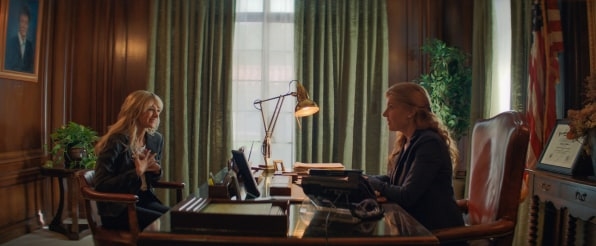Why ‘Promising Young Woman’ should win Best Picture at this year’s Oscars
Things are seldom what they seem in Promising Young Woman, both within the world of the movie and in the way it’s presented to the audience.
We open with pulsating pink-and-blue lights and a boy-crazy, bubblegum pop song, layered over close-up, middle-aged beer guts and tucked-in khakis grooving in slow-motion on the dance floor. Suddenly, we zoom out, the music drops into the background, slo-mo becomes regular-mo, and this flock of middle managers looks much sadder without its digital gloss. In short order, we soon meet a drunk woman who isn’t actually drunk, a Good Samaritan who is actually a predator, and blood that is actually ketchup. And we’re now only up to the title card: an anachronistic, dripping nod to old exploitation thrillers, which this movie is actually not.
Perhaps in part because of the way this chameleonic, tone-shifting, genre-bender plays with expectations, Promising Young Woman has proven polarizing. Some people love it—enough to net it five Academy Award nominations—while others hate it, and others still don’t know quite what to make of it. If you ask me, however—and to be clear, not one person has—Promising Young Woman is an uncompromising cultural reset on rape culture and a worthy contender for Best Picture of the year.
Promising Young Woman, its title a play on how women famously tend to be judged on their past while men are judged on their potential, is the debut feature from writer-director Emerald Fennell, previously best known for her work as showrunner on Killing Eve season two. (Fennell is also an actor, costarring as young Camilla Parker Bowles on The Crown, and cameo-ing in her own film as a beauty blogger with insight on “blowjob lips.”)
Back in 2017, Fennell brought to Sundance a short film called Careful How You Go, about women’s potential for being frightening and malevolent in various ways. “The premise is kind of how can you ruin a stranger’s life without touching them or threatening them or doing anything sinister,” she told the Los Angeles Times. “That felt like a . . . historically kind of female way of enacting rage.”
A few short years later, Fennell had written and directed Promising Young Woman, a movie that radiates the raw rage of women who witnessed the #MeToo movement almost immediately get hijacked by questions of whether the #MeToo movement had gone too far. Carey Mulligan stars as Cassie, a former med student whose best friend, Nina, fell into a deep depression following her on-campus rape and eventually killed herself. Cassie has since spent the ensuing seven years pretending to get so drunk in nightclubs that men offer to take her home, thus providing an opportunity for a teachable moment. Things change, however, when a flirtatious friend from med school lets her know that Nina’s rapist, Al (Chris Lowell), is back in town for his wedding, at which point she puts together a complicated, four-pronged revenge plot.
This is the part where I must insist if you haven’t seen Promising Young Woman yet and want to remain unspoiled, close this tab immediately. Things are about to get super spoil-y.
All throughout the film, Cassie confronts men, and they get enraged by it. Construction workers holler at her during the opening credits, and all it takes is stopping and staring back to provoke their ire.
“What are you staring at, can’t take a joke?” one of the men says. “F*ck you, then.”

[Photo: courtesy of Focus Features]
On average, men do not enjoy being confronted by women about their own abhorrent behavior. None of the many confronted men in this film seem to enjoy it, anyway. The genius of Promising Young Woman, though, is that it’s a feature-length instance of a woman (Fennell) confronting potentially millions of men about their own actions in as enjoyable a way as possible, given the heavy subject matter.
And confront male viewers she does.
This film features so many different flavors of Men Who Don’t Realize They’re Part of the Problem. Most men understand that the Harvey Weinsteins and Bill Cosbys of the world are monsters, but not that their friends and especially they, themselves, are more than capable of monstrousness. Promising Young Woman doesn’t let them get away with it.
Fennell slyly populates her film with eminently lovable male TV and film stars like Adam Brody, Sam Richardson, and Max Greenfield, all playing against type. Well, that’s not technically accurate. For all that fans of The OC, Veep, and The New Girl know, the nice-guy types these actors have all played before could have been date rapists in private without those shows ever addressing it—just as any man’s best friend might be as well.
Things are seldom just as they seem in real life, too.
To their urgent discomfort, men will almost invariably feel twinges of recognition in this rogue’s gallery of hideous men, especially since one of them is hiding in plain sight as Cassie’s love interest. Promising Young Woman’s largest tonal shift occurs when the film briefly, giddily, becomes a romantic comedy; Cassie shares a falling-in-love montage with Ryan (Bo Burnham), the former med school classmate who let her know that Nina’s rapist, Al, has returned to town. This whimsical sugar rush sets us up for another tonal comedown, however, when Cassie discovers that Ryan was one of many dudes present when Nina was raped. Apparently, it had no impact on him at the time or even shortly afterward, when Nina killed herself.
Prior to this moment, Ryan had been the one man in the film, besides Cassie’s father (Clancy Brown), to carry the Not All Men torch. Upon closer inspection, though, red flags were already there. Ryan’s adorkable bit on his and Cassie’s first date, in which he “unwittingly” walks her back to his place at the end of the night, carries a whiff of casual menace. Ryan also seems to understand that Al is a bad guy (“God help her,” he says of Al’s fiancée when Cassie mentions the wedding), but not so bad a guy that Ryan won’t hang out with him socially. Rape culture isn’t perpetuated just by rapists but the buddies willing to look the other way.
When Cassie confronts Ryan about what she’s learned, all he can do is defend himself (“I was just a kid!”) and then savagely insult Cassie. Fennell lulls viewers into rooting for this lone nice guy among a roster of fakes, only to reveal that he, too, is something of a fake. And she does so in a way that forces men to interrogate themselves about whether anything in their own pasts might put them in league with Ryan or any of his friends.
This scene arrives immediately before the movie hits its peak-divisive final 20 minutes.

[Photo: Merie Weismiller Wallace/Focus Features]
While the trailer left it to the viewer’s imagination what kind of violent revenge Cassie exacts on the men she goes home with, up until this point it appears to be bloodless. We never do get to decipher her color-coded system for tallying up each conquest in a notebook, but from what we do see, Cassie is more bent on inflicting psychological carnage. That’s what she does to the women in her revenge plot—including the dean (Connie Britton) who didn’t take Nina’s case seriously enough.
When Cassie is finally alone with Al, though—drugging an entire bachelor party in the guise of a rainbow-wigged nurse to get to him—she’s ready to get her hands dirty. She approaches her subject, who is handcuffed to a bed, wielding a scalpel with the intent of carving Nina’s name all over his body. Just as she’s getting started, though, Al manages to loosen one hand and overpowers her. It’s all the leverage he needs. Soon enough, he has a pillow over Cassie’s face and a knee clamped on top of it, slowly suffocating her for two grueling minutes. Viewers weaned on conventional movies know to expect her hand to alight on some makeshift weapon and break free. Not this time, though; Cassie is dead.
During the film’s first test screening, two audience members got into a shouting match during this scene, with one of them yelling, “If you don’t like it, you don’t have to stay!” It was an accurate precursor to the split among audiences at large upon the film’s eventual release.
But it was the only ending Fennell could see for Cassie.
“It’s how the system works. The house always wins,” the director told Entertainment Weekly. “For me, it would be an enormous injustice to be so honest the whole way through this movie and then have a Hollywood ending that also let us all off the hook.”
Originally, the film ended just after Cassie’s death, with Al and his friend Joe (Max Greenfield) burning her body in the woods. Fennell’s financiers balked at such a bleak finale, however, so she went back to the drawing board. After briefly entertaining the idea of Cassie killing everyone at Al’s bachelor party instead, Tarantino-style, she settled on the eventual ending of Cassie having a fail-safe in place to alert authorities about her murder, along with newly surfaced video evidence that Al raped Nina.
The movie ends with the police raiding Al’s wedding, and Cassie’s extremely well-timed prescheduled text messages to Ryan’s phone. While some critics have taken issue with the fact that it’s the system that saves the day, when in real life it doesn’t often happen, the only reason the system might prevail here is that Cassie did all the work, and even had to die to make it happen. It’s not the system’s triumph, it’s Cassie’s—despite her not surviving to appreciate it.
Of course, judging by what we’ve just seen, there was probably never a happy ending in the cards for Cassie anyway. Whether or not she should have spent the past seven years differently, her life was indirectly ruined by Al’s rape of Nina. The toll this whole revenge plot has taken on Cassie is telegraphed throughout the movie, well before her death. And yet only recently have a rape survivor’s potential suicide, or their friend’s guilt, factored into the decisions that the real-world equivalents of Britton’s dean tend to make about whether to ruin a promising young man’s life over a rape allegation.
After Cassie uses that fictitious dean’s daughter to make the dean see how her priorities have been poisonous, Cassie says to her, “I guess you just needed to think about it in the right way.” It’s a reflection of how some people are incapable of developing empathy on any issue until it hits close too home.
Promising Young Woman is an entertaining, challenging movie that will hopefully use a Best Picture win to hit the widest audience possible too close to home.
Fast Company , Read Full Story
(35)



